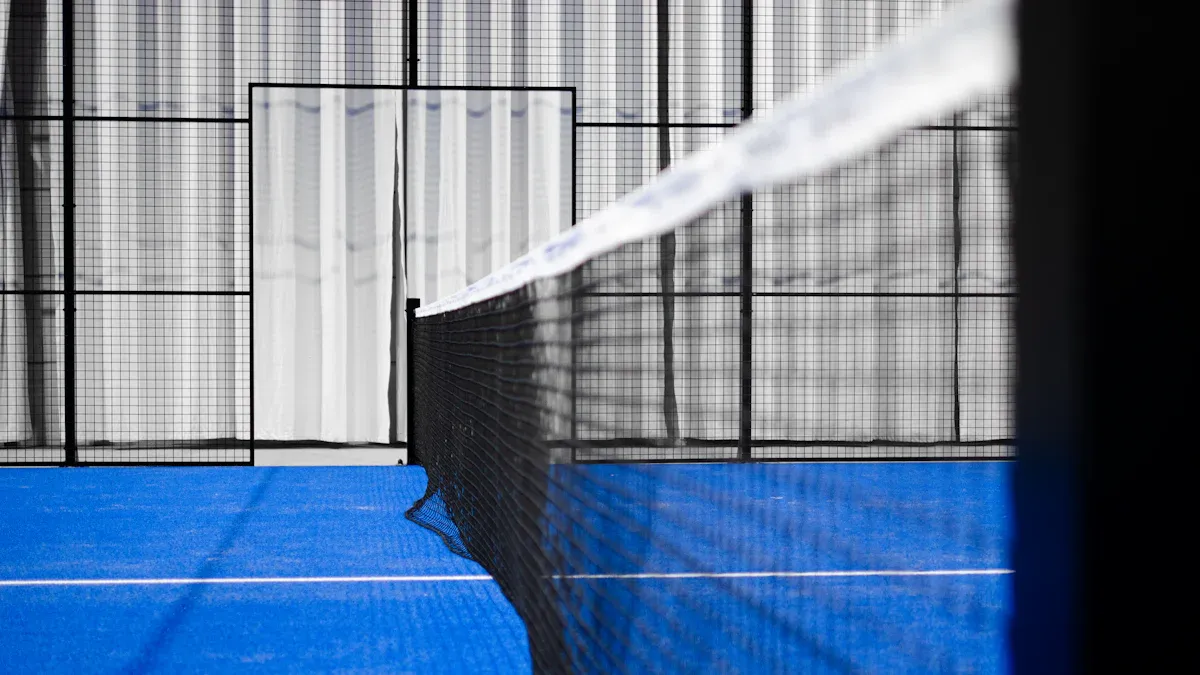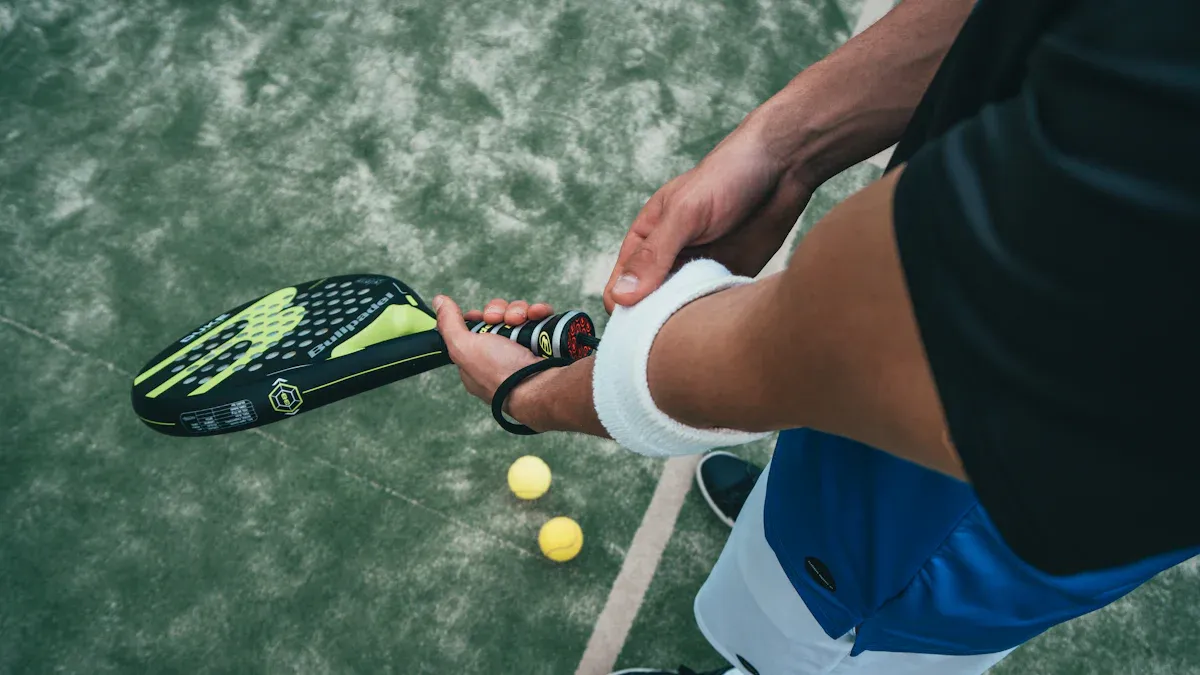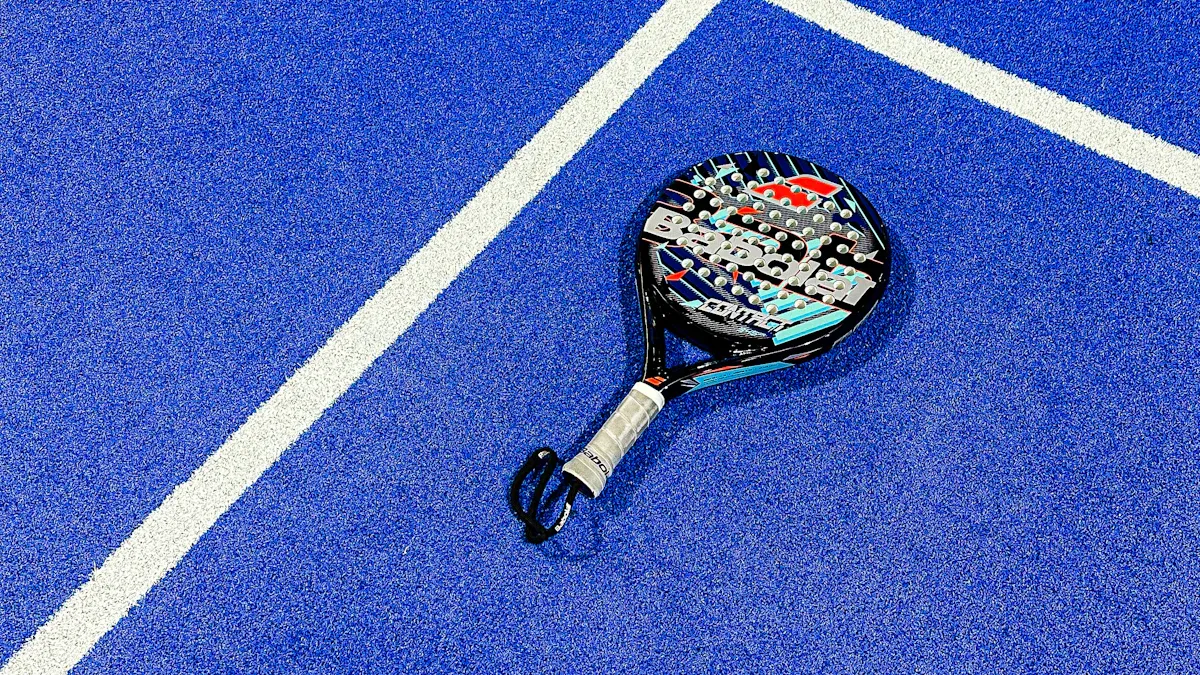
Have you been looking for a sport that is easy to learn but also exciting? Padel is just that game! It combines skill and strategy, making every point enjoyable. Padel is suitable for players of all ages and levels . It is a fun and physically active sport that helps you stay in shape. It is also a great way to socialize. Imagine enjoying a game with friends or new acquaintances - this is what makes padel an unforgettable experience.
Important Points
- Padel is a simple game that combines skill and strategy. It is suitable for players of all ages.
- Every game starts with a serve. Focus on precision and strategy, not power, to surprise your opponent.
- Common service errors include hitting the ball out of bounds or stepping on the service line. Practice will help reduce these errors.
- Understanding the scoring system is important. Points are scored similarly to tennis and strategic play is required to win.
- Communication with your partner is important in padel. Discuss strategies and roles before the game to avoid confusion.
- Use walls wisely during the game. They help to bounce the ball back and give you a tactical advantage.
- Practice basic strokes, such as forehand and backhand, to gain confidence and improve your game.
- Choose the right equipment, such as a lightweight racket and suitable shoes, to improve your playing experience.
Padel rules
Starting the game
Serving Basics
A padel game always starts with a serve. It is important to follow a few simple rules when serving to ensure the game runs smoothly. You must stand behind the serving line and hit the ball with an underhand technique. This means that the ball must be hit at or below the waist. During the serve, the ball must first bounce on the ground and then land in the opponent's service box. If the serve is correct, the game begins.
Serving is special in padel because it doesn't require too much strength. Instead, focus on precision and strategy. If you're a beginner, practice slowly and find your rhythm. Serving is your chance to control the game and surprise your opponent.
Serving errors
Mistakes can happen when serving, but don't let that discourage you. The most common mistakes are:
- The ball does not land in the opponent's service box.
- The ball touches the net before bouncing.
- The server steps on or over the service line.
If you make a mistake, you get a second chance, or a second serve. If that fails too, the point goes to your opponent. Practicing will help you avoid these mistakes and make your serves more solid.
Gameplay
Ball movement
In padel, the ball movement is dynamic and exciting. The ball must first bounce on the ground before it touches the wall or net. If the ball bounces twice on the opponent's side, you win a point. You also win if your opponent hits the ball directly into the net or out of bounds.
During the game, it is important to follow the trajectory of the ball and react quickly. The movement of the ball creates opportunities for both attack and defense. This makes the game versatile and strategic.
Using walls
On a padel court, walls are an integral part of the game. You can use the walls to hit the ball back, but only after the ball has first bounced on the ground. The walls give you the opportunity to play smart and put your opponent in a difficult position.
For example, if your opponent hits the ball hard, you can use a wall to slow the ball down and prepare for a counterattack. Using walls takes practice, but it adds excitement and tactical depth to the game.
Point system
Scoring
Padel uses a scoring system similar to tennis. Points are scored as follows: 15, 30, 40 and match win. When both teams reach a score of 40:40, this is called a "deuce". To win, you need to score two consecutive points.
There are several ways to win a point. For example, if your opponent makes a mistake, the ball bounces twice, or flies out of bounds, the point goes to you. This system keeps the game exciting and motivates you to fight for every point.
Determining the winner
To win a match, you must win a certain number of games, depending on the agreed format. Usually, it is played in the best of three sets. To win a set, you need to win at least six games, but by a margin of two games. If the score is 6:6, a quick final game, or tie-break, is often played.
These rules are strictly enforced in tournaments to ensure fair play. These rules give structure to the game and help you focus on developing your skills and strategy.
Important rules for beginners
Common mistakes
It's perfectly normal to make mistakes when starting out in the game of padel. They are part of the learning process and will help you understand the game better. Here are some of the most common mistakes beginners often make:
- Incorrect racket hold : Holding the racket too tightly or in the wrong position can affect the accuracy and power of your shot.
- Ignoring the walls : Walls are important in the game of padel, but beginners tend to forget about them or use them ineffectively.
- Rushing : Lack of patience often leads to hasty strikes that can be inaccurate.
- Lack of communication : Communication with your partner is key, but beginners often forget to discuss strategy with their playing partner.
If you notice yourself making any of these mistakes, don't worry. Practice and mindfulness will help you avoid them. Focus on technique and communication to improve your game.
Tip : If you find using walls difficult, start with simple exercises. Hit the ball against the wall and watch how it bounces. This will help you better understand how walls work in the game.
How to remember the rules?
Memorizing the rules of padel doesn't have to be difficult. You can use simple tricks to learn them quickly:
- Visualization : Imagine game situations and think about how the rules apply. For example, how the ball must first bounce on the ground before touching the wall.
- Discussing with a partner : Talk about the rules with your partner. You'll remember them better if you discuss them together.
- Practice : The more you play, the more natural the rules will become. Try playing in different situations to solidify the rules.
- Simple keywords : Use keywords like "edge underhand technique" or "wall after bounce" to help you remember important points.
The rules of padel are simple if you take the time to learn them. Patience and consistency will help you master the rules quickly.
Note : If you are just getting to know the rules, you can write them down and review them as needed during the game. This will give you confidence and help you focus on the game.
Practical tips for beginners

Technique and movement
Basic strokes
There are some strokes in the game of padel that you should definitely master. Learn them first main strike or forehand. This is an easy and effective way to direct the ball to the opponent's side. Hold the racket firmly, but not too tightly, and focus on accuracy. Once you have mastered the forehand, also practice backhand , which allows you to hit the ball even if it comes to your weaker side.
Another important blow is volley , which is used to hit the ball before it hits the ground. It's a great way to keep your opponent under pressure. If you want to make the game even more exciting, practice also smash – a powerful blow that can leave the opponent with few chances.
Tip : Focus on simple strokes at first and practice them regularly. As you feel more confident, add more complex strokes to your game.
Improving movement
In padel, movement is as important as stroke technique. You need to be quick and flexible to reach the ball in any situation. Practice lateral movement , as this will help you maintain your position on the field. It is also important correct starting position – keep your knees slightly bent and be ready to move in any direction.
If you want to improve your movement, try simple exercises like: running from line to line or Speed and change of direction training . These will help you develop both speed and endurance.
Tip : Don't forget to warm up before the game. This reduces the risk of injury and improves your mobility.
Collaboration and communication
Communication with a partner
Padel is a doubles game, which means that cooperation with your partner is key. Communication will help you coordinate your strategy and avoid confusion on the court. Talk to your partner before the game. tactics and divide roles – who covers which area? During the game, always shout when you are going to kick the ball. This avoids situations where you both go for the same ball.
Tip : If you are a beginner, choose a partner who is patient and willing to guide you. Learning together makes the game more enjoyable.
Developing teamwork
Good teamwork is not just about communication, but also about trust and playing to each other's strengths. If your partner is a better attacker, let them take more of the offensive shots while you focus on defense. Cooperation also means supporting each other, even if one of you makes a mistake.
- Coordinate positions : Maintain balance on the field to cover as much ground as possible.
- Share responsibility : Don't be afraid to take the initiative when you see a good opportunity to win a point.
Note : Communication and teamwork are skills that can be developed. The more you play together, the better your cooperation will become.
Using walls
Strategic use
On a padel court, walls are your best friends. Use them wisely to keep the ball in play and put your opponent in a difficult position. For example, if your opponent hits the ball hard, let it bounce first on the ground and then on the wall. This will slow the ball down and give you time to prepare for a counterattack.
| Proof | Description |
|---|---|
| Using walls | Players can use walls to keep the ball in play and disrupt opponents, which gives them an advantage. |
| Practice | Practicing wall shots at different angles helps players better understand how using the wall can affect the flow of the game. |
Walls add strategic depth to the game. If you learn to use them correctly, you can improve your game and surprise your opponents.
Exercises with walls
The skill of using walls comes with practice. Start with simple drills where you hit the ball against a wall and watch it bounce. Try different angles and speeds to understand how the walls affect the ball’s movement. As you get more confident, add movement to the drill – for example, hitting the ball against a wall and quickly moving into position to be ready for the next shot.
- Practice accuracy : Focus on making the ball bounce in the desired direction.
- Combine strokes : Try alternating between forehand and backhand to develop your skills in both strokes.
Tip : Wall exercises are a great way to improve your playing skills even if you don't have a partner.
Padel court and equipment

Field characteristics
Field dimensions
A padel court is smaller than a tennis court, but that makes the game more exciting. The court measures 10x20 meters and is divided into two halves by a net. This compact size means you don't have to run long distances, but you do have to be quick and skillful.
The court surface is usually artificial turf, which provides good traction and comfortable movement. If you are a beginner, you will find that a smaller court will help you control the ball better and enjoy the game.
Walls and their role
The padel court is surrounded by glass and metal grid walls. These walls are not just for decoration - they are an important part of the game. You can use them to hit the ball back, which adds strategy and excitement to the game.
For example, if the ball flies towards you and hits a wall, you can use it to your advantage. Walls give you more time to react and the opportunity to surprise your opponent. If you practice using walls, your game will become much more versatile.
Tip : Start with simple exercises where you hit the ball against a wall and watch it bounce. This will help you understand how walls work in the game.
Equipment
Padel racket features
A padel racket is different from a tennis or badminton racket. It is smaller and has no strings. The surface of the racket is made of a strong material with holes to reduce air resistance. This makes the racket lighter and easier to handle.
Beginners should choose rackets that are lighter and have a larger hitting surface. They will help you hit the ball better and reduce the chance of making mistakes.
Special features of padel balls
Padel balls look like tennis balls, but they have less pressure. This means they don't bounce as high or as fast. This makes the game easier and more controllable for beginners.
When choosing a ball, make sure it is specifically designed for padel. The right ball will help you enjoy the game more and improve your skills.
Equipment suitable for beginners
How to choose a racket and balls?
If you are just starting out, choose a racket that is light and comfortable to hold. A lighter racket will help you control the ball better and reduce hand fatigue. Also, choose balls that are specifically designed for padel.
Tip : If you are not sure what equipment to choose, ask the staff at the padel center for advice. They will help you find the right equipment for you.
The importance of footwear
The right shoes are very important when playing padel. Use special padel or tennis shoes that provide good grip on artificial grass. They will help you move faster and reduce the risk of slipping.
When choosing shoes, make sure they are comfortable and support your foot. The right shoes will make the game more enjoyable and help prevent injuries.
Note : Invest in quality shoes. They will last longer and improve your playing experience.
Starting a game of padel is easy and fun. You don't have to be an expert to understand the rules. Focus on technique , practice using the walls, and communicate with your partner. These small steps will make you more confident and help you enjoy the game. Patience and consistency will take you further.
Try padel and discover how this sport offers both physical activity and social joy. You'll make new friends and spend quality time while playing. Padel is more than just a game - it's an experience worth trying! 😊
FAQ
What is padel and how is it different from other racket sports?
Padel is a fun and social racket sport played as a doubles match. Unlike tennis or badminton, it uses a smaller racket and glass walls, making the game more strategic. Padel is easier to learn and suitable for players of all ages.
Do you need previous experience to play padel?
No, padel is perfect for beginners. You don't need any previous experience. The rules are simple and the equipment is easy to handle. All you need to start playing is a desire to try and a willingness to learn.
How long does a padel game last?
The length of the game depends on the format and the level of the players. Typically, a game lasts 60-90 minutes. If you are playing with friends for fun, you can adjust the length yourself.
What equipment do you need to get started?
To play padel you need a racket, a ball and suitable shoes. For beginners, lightweight rackets and low-pressure balls are suitable. If you don't have equipment, you can often rent it from padel centers.
Is padel physically demanding?
Padel is a moderately physical sport. It is suitable for both beginners and experienced players. The game develops endurance and coordination, but is not too tiring. You can choose the pace of the game yourself.
Can padel be played all year round?
Yes, padel can be played on both indoor and outdoor courts. Many padel centers offer year-round play, making padel a great sport at any time of year.
Is padel an expensive sport?
Padel is affordable. Beginner equipment is affordable and court rentals are often reasonably priced. You can also rent equipment, which makes it even easier to get started.
How to find playing partners?
The padel community is open and friendly. Many padel centers organize events and training sessions for beginners, where you can find new playing partners. You can also join local padel groups on social media.
